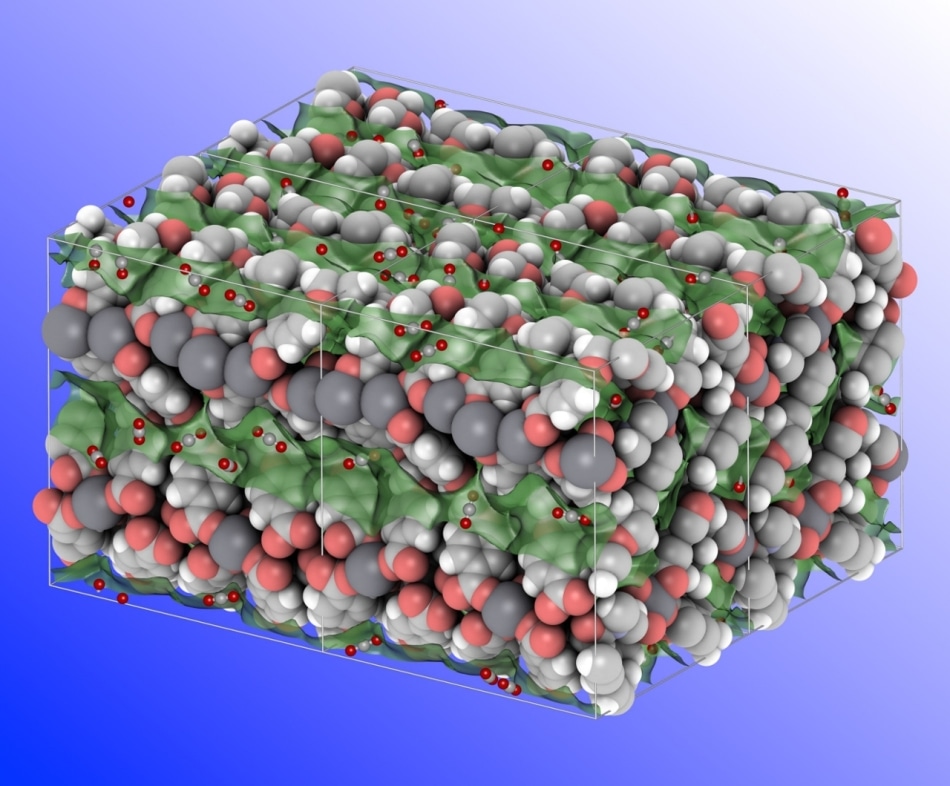Apr 19 2018
A team of scientists from the University of Amsterdam’s Research Priority Area Sustainable Chemistry have created a novel porous material that can selectively adsorb CO2. According to team leader Dr Stefania Grecea, their design of a water-stable metal-organic framework (MOF) can open new ways to a cost-effective separation of CO2 from power plant emissions. The details of their work can be found in the journal Inorganic Chemistry Frontiers.
 Molecular structure of the novel calcium-based MOF. Small CO2 molecules can be seen adsorbed within the channels (green transparent) of the microporous material. (Image credit: HIMS)
Molecular structure of the novel calcium-based MOF. Small CO2 molecules can be seen adsorbed within the channels (green transparent) of the microporous material. (Image credit: HIMS)
Climate change is interrelated with increasing CO2 emissions due to the combustion of fossil fuels in power stations, factories, vehicles, and homes. One way to maintain the atmospheric CO2 concentration within acceptable levels is by selectively eliminating it from power plant emissions. The physical adsorption of CO2 using porous materials offers an economically feasible route for such CO2 capturing. Compared to the presently used chemisorption techniques, it requires less energy for the regeneration of adsorbents.
At the Research Priority Area Sustainable Chemistry of the University of Amsterdam (UvA), Dr Stefania Grecea prepares synthetic strategies for creating porous materials that allow efficient adsorptive separations.
The water-stable metal-organic framework created by Grecea and co-workers selectively adsorbs CO2 from a CO2/N2 mixture. The research was performed by PhD student Yiwen Tang in partnership with Dr David Dubbeldam of UvA's Computational Chemistry group, Dr Simon Teat of the Lawrence Berkeley National Laboratory (USA), and Prof. Anastasios Tasiopoulos of the University of Cyprus.
Metal-Organic Frameworks
Metal-organic frameworks (MOFs) can be defined as crystalline microporous materials that exist of metal ions (or groups of metal ions) connected by organic ligands. MOFs are highly promising materials for gas separation since their pore surfaces can be easily functionalized to adjust the interaction with a range of gas molecules. They also possess very high surface areas which provide for peak selectivity and capacity. Furthermore, MOFs offer the correct balance between operational lifetime, high adsorption capacity, and energy requirement for regeneration.
The UvA researchers developed a series of MOFs using a flexible organic linker along with alkaline metal ions, which are available in plenty, lightweight, and economical. They show that the 3D structure of these MOFs shrinks when the guest molecules are eliminated. With calcium-based materials, this particular behavior results in large diffusional resistances towards N2 over CO2 molecules.
Selective and Water-Stable
Experimental studies conducted by Yiwen Tang and theoretical calculations performed by Dr David Dubbeldam established a very good CO2/N2 separation selectivity that is considerably higher than what has been stated for other MOFs. Besides this, the specific design of the organic linker safeguards the calcium ions from being attacked by water molecules. Thus, the new MOF materials also have an extremely high humidity stability.
According to Dr Grecea, the research paves way for new avenues in creating economical and non-toxic materials, not only for CO2 capture but also for other gas separations. Presently, her team is further enhancing the water stability of the unique MOFs in addition to developing basic synthetic routes towards stable alkaline-earth MOFs for a wide range of molecular separations.